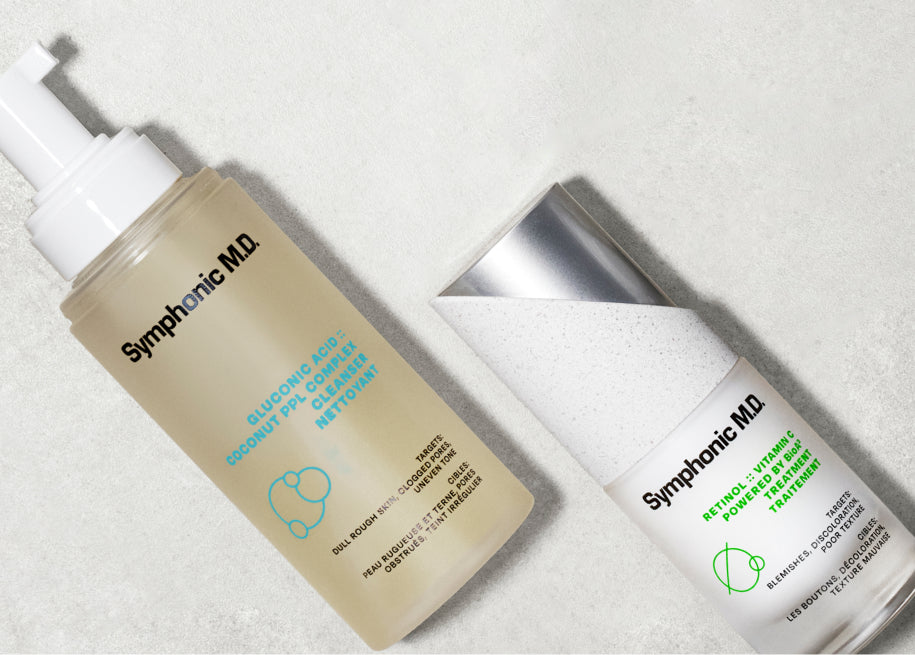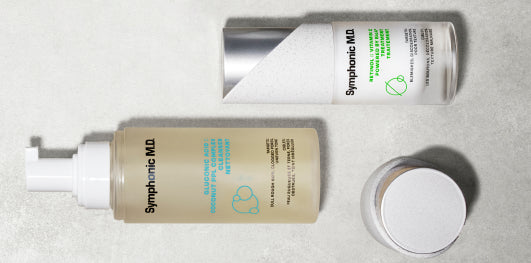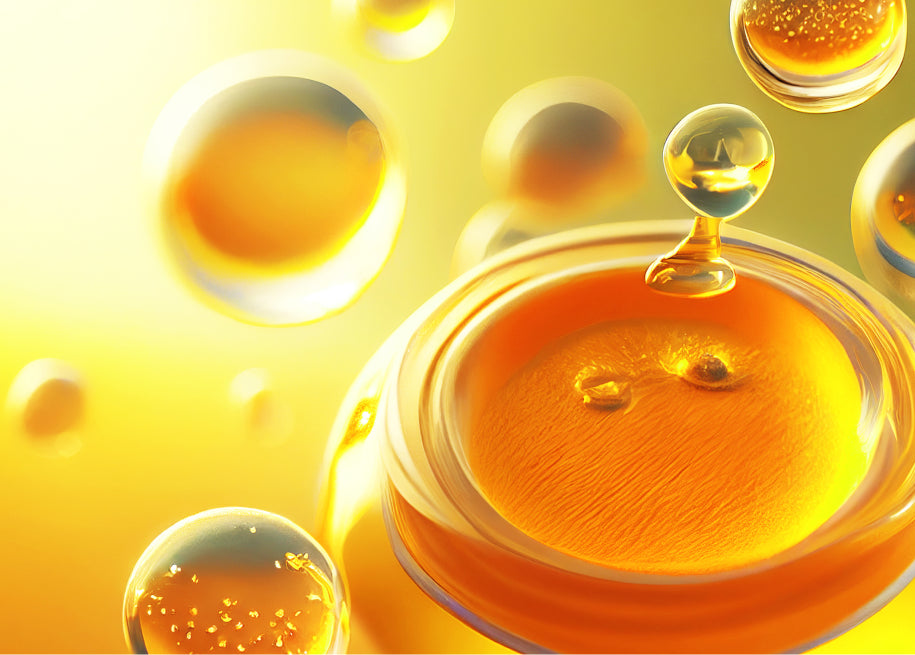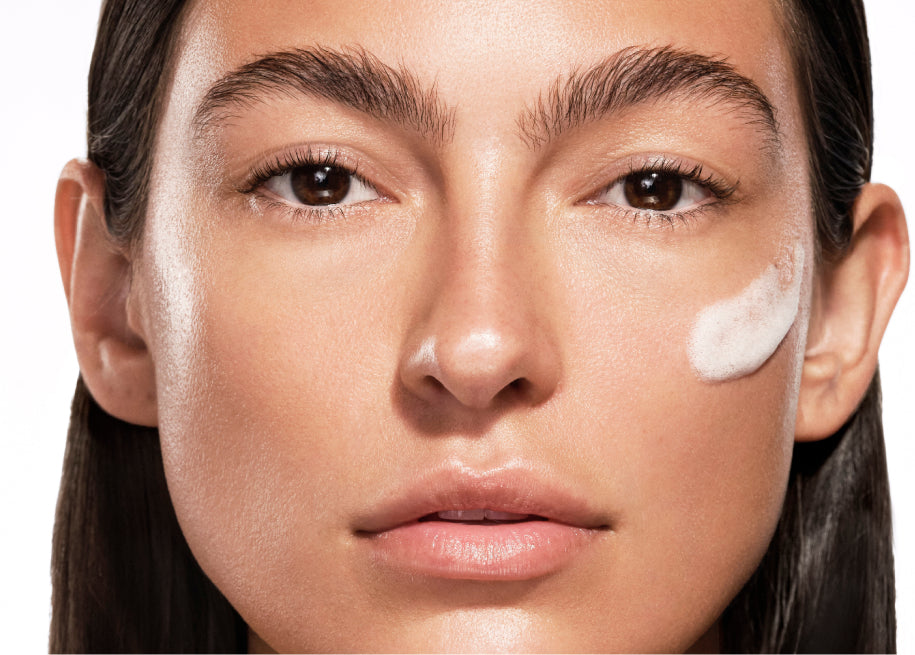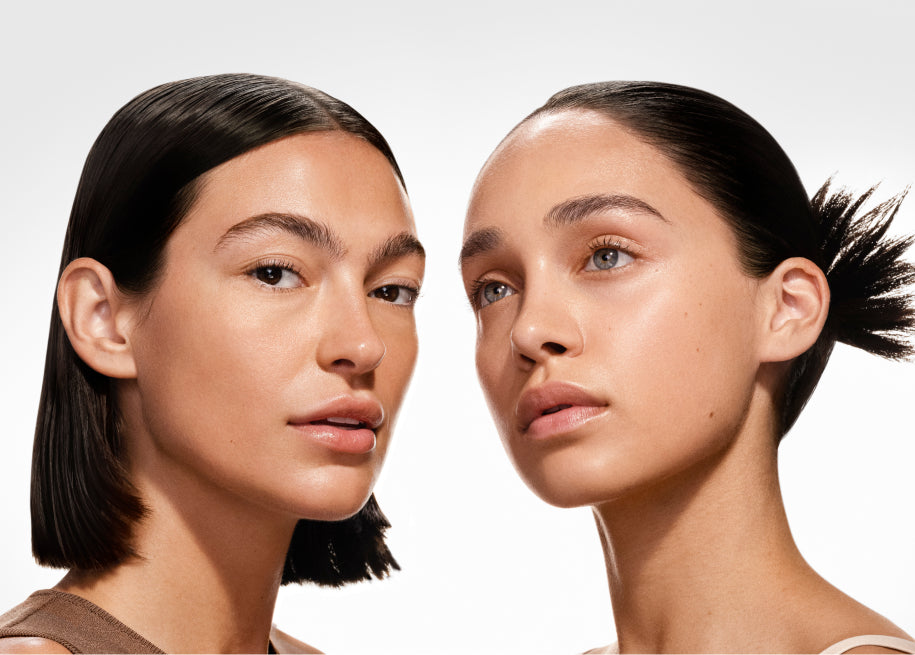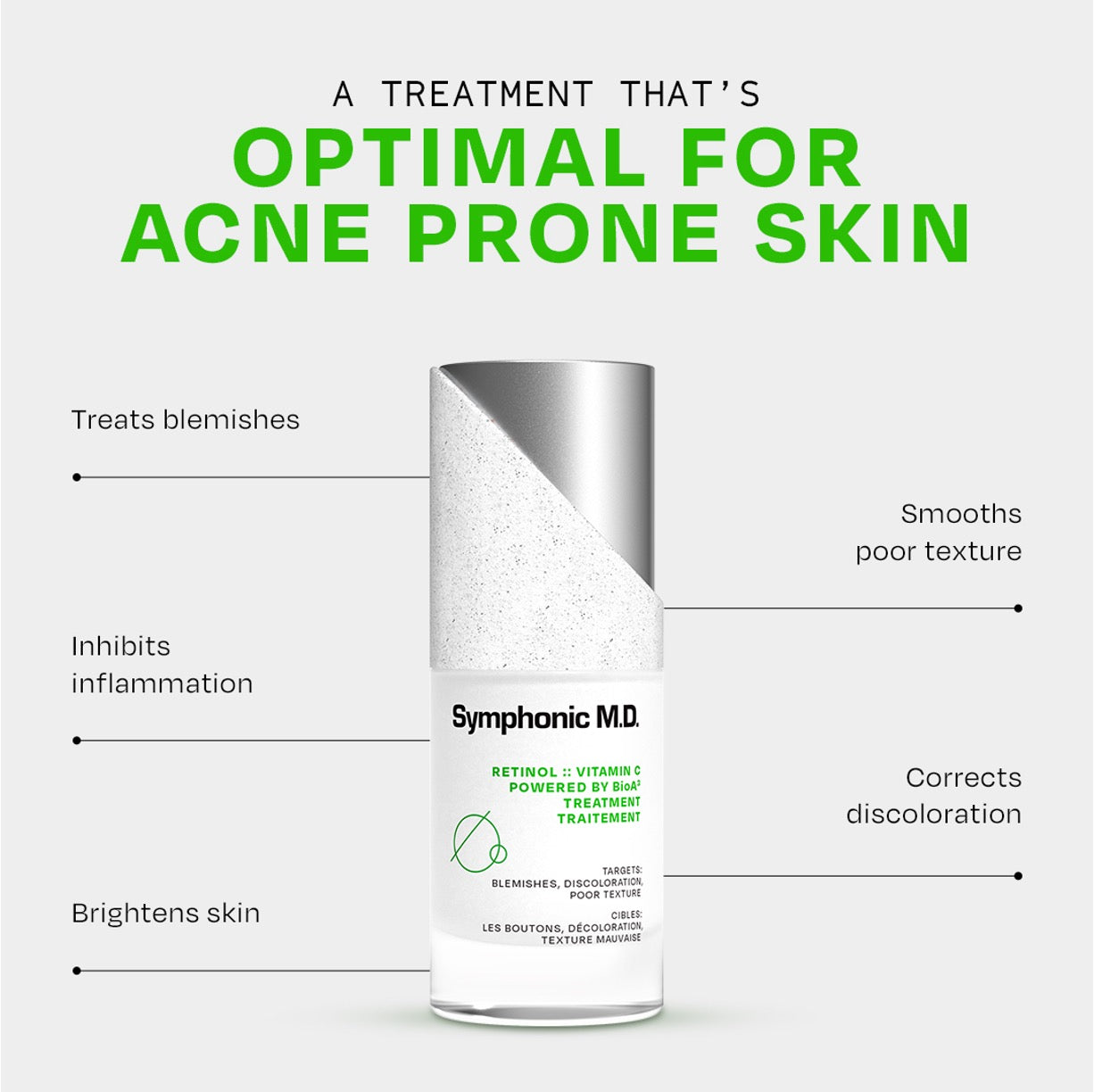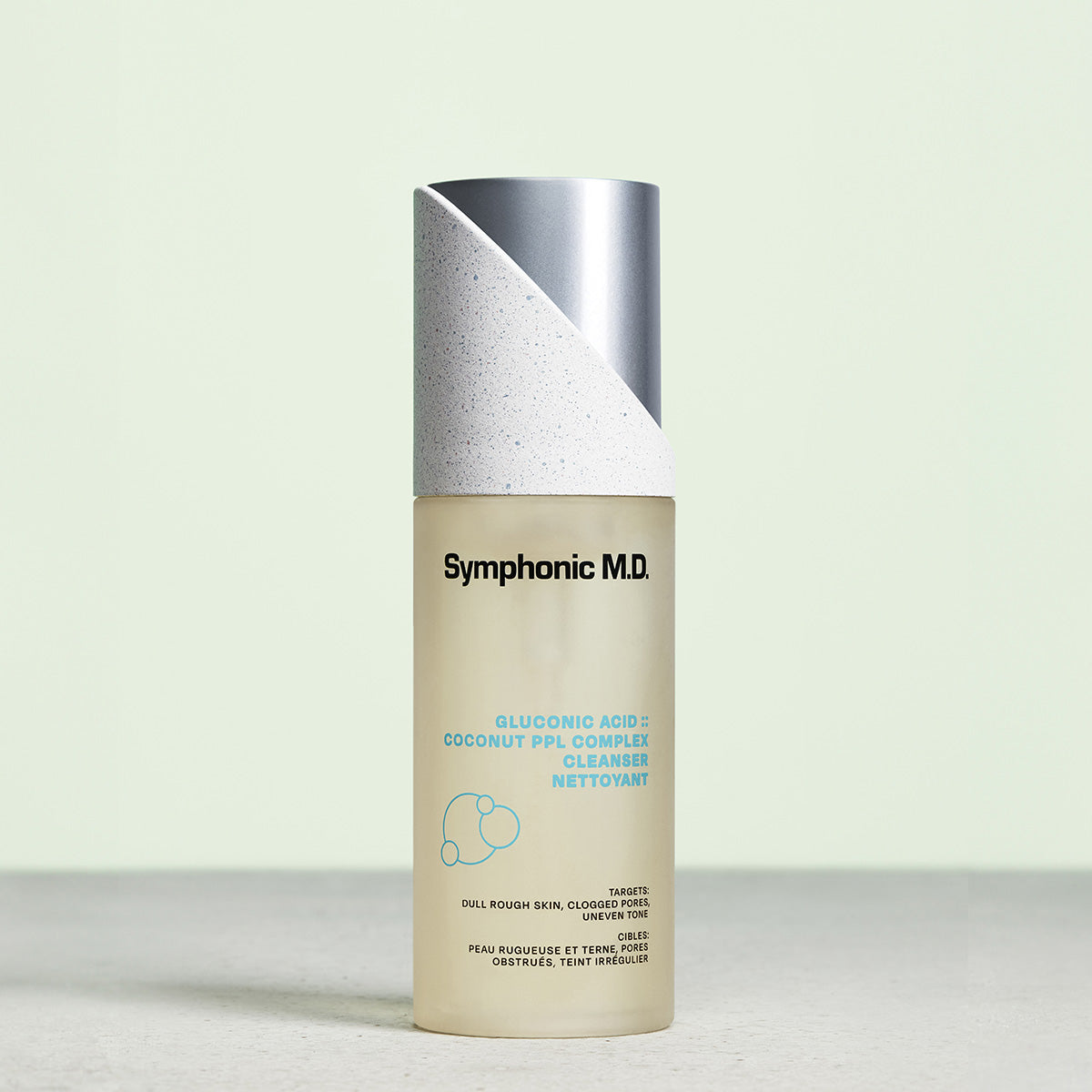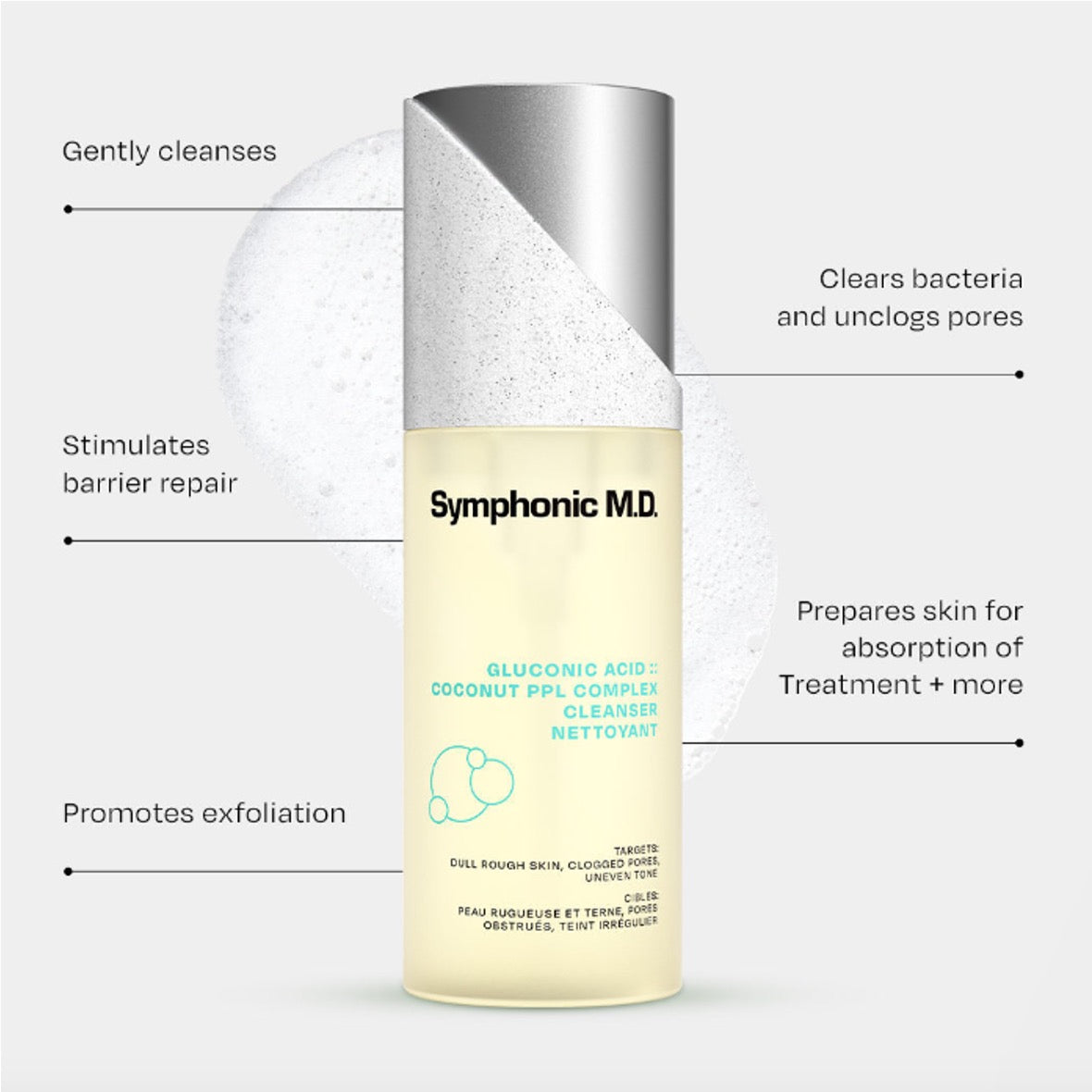If you’ve suffered from grainy skin, you’ll be familiar with the rough, bumpy feel of it under your fingertips, the dry and irritated feeling it can sometimes cause, and the havoc it plays with your make-up – often appearing more obvious under foundation.
As with other textured skin issues, such as flaky skin, acne, redness, and inflammation, a grainy complexion can damage your confidence. Plus, if the methods you've tried have failed to make a difference, you can begin to feel helpless.
However, understanding the cause of your grainy skin will give you valuable insights in how to treat it – whether that’s by changing your skincare routine, altering your lifestyle, seeking professional help, or using a combination of approaches.
What is grainy skin?
Grainy skin – also known as textured skin – usually shows up as rough, raised, or bumpy patches on the face. These uneven areas of skin are grain-like in appearance, hence the name.
The good news is, there are several ways you can improve the appearance of a grainy complexion, and even prevent it from happening in the first place.
What causes grainy skin?
Grainy skin texture on the face has many different causes, including genetics, sun exposure, and lifestyle choices. Identifying the reason for yours is the first step towards solving the problem.
Aging
As you age, your cells renew at a slower rate, and this leads to a build-up of dead cells. If they don’t shed properly, these dead skin skells can clump together to form rough patches.
Genetics
Some people just have naturally grainy complexions. Usually this is a result of different skin issues, including skin sensitivity, less ability to produce collagen and elastin, whether they’re prone to large pores or acne, or even conditions such as eczema.
Dehydration
When your skin is dehydrated, it loses moisture and can become dry, tight, and rough. The skin’s barrier can also be damaged and it becomes sensitive to irritation, so it can feel coarse and grainy.
Excessive exfoliation
Exfoliating your skin too much, or with harsh exfoliants, can strip away your protective layer of healthy skin, compromise your skin barrier and cause irritation – resulting in dryness and roughness.
Pollution
Airborne pollutants can clog the skin’s pores, giving it a rough texture. They can also generate harmful free radicals, which damage skin cells and accelerate the aging process.
Harsh weather
Cold air and windy conditions can strip the skin’s natural oils and moisture, and even cause windburn, making it feel dry and chapped. It can also constrict blood vessels, meaning less oxygen and nutrients reach the skin cells, causing an uneven texture on your skin.
Sun exposure
Over time, exposure to UV rays breaks down collagen in the skin, which leads to less suppleness and a rough, grainy surface. It can also cause dehydration, making the skin dry and rough.
Lack of exercise
A lack of exercise can lead to poor blood circulation, which can slow down the delivery of oxygen and nutrients to your skin. Plus, you may produce less collagen than someone who is more active. These factors can have a significant impact on your skin’s elasticity and texture.
Diet
If your diet lacks certain important nutrients, your skin could pay the price. Vitamin C, vitamin E, and omega-3 fatty acids, for example, promote healthy skin and a smooth texture. On the other hand, a diet high in sugar and processed foods could contribute to acne and other skin issues.
Lack of sleep
Your skin cells repair and regenerate during your sleep, preventing moisture loss and protecting it from external irritants. A lack of sleep can therefore result in dryness and irritation.
Smoking
Smoking constricts blood vessels, so less blood can circulate to the skin, promoting an uneven texture. It can also cause premature aging and dehydration, which we already know can impact the skin.
Alcohol
Drinking alcohol leads to dehydration, inflammation, and a breakdown of collagen and elastin – which can lead to dry and grainy skin. It also interferes with your sleep patterns, so your skin cells don’t regenerate and repair at an effective rate.
Grainy skin – also known as textured skin – usually shows up as rough, raised, or bumpy patches on the face.
How can you fix grainy skin?
Once you’ve identified the cause of your grainy skin, you can make an informed choice about how to minimize its appearance, and even prevent it from recurring.
This could involve improving your skincare regime to introduce a retinoid or a sunscreen, changing your lifestyle to become healthier from the inside, or seeking help from a professional.
Whatever route you take, allow time for your skin to get used to the changes, and remain consistent with your approach.

Skincare
Your skincare regime can dramatically improve the appearance and texture of grainy skin. By incorporating a few simple steps into your daily routine, you can significantly diminish textured skin on the face, and prevent it from coming back.
However, keep in mind that everyone’s skin is unique, so it’s worth experimenting to find out what works for you. If you have any doubts, speak to a dermatologist who can recommend a personalized approach for your particular skin type.
Exfoliate
Exfoliating is an effective way of removing a build up of dead skin cells. Make sure you choose a gentle exfoliant containing spherical particles, and avoid using it more than twice-a-week.
Alternatively, you can remove dead cells with chemical exfoliants containing gentle acids such as AHAs (alpha-hydroxy acid) or BHAs (beta-hydroxy acid), which are much less abrasive.
Hydrate the skin
You can combat dry skin by regularly using moisturizers containing powerful hydrators. Extra-nourishing ingredients, such as glycerin and hyaluronic acid, draw moisture deep into the skin and lock it in, resulting in a smooth, supple texture, and a radiant glow.
Use vitamin C
Vitamin C is a powerful antioxidant that exfoliates and hydrates your skin, as well as increasing collagen production – all leading to a smoother and brighter complexion. In fact, studies on vitamin C have shown that topical daily use can improve overall skin texture by decreasing both roughness and wrinkles.
Skincare products such as our Retinol: Vitamin C Powered by BioA3 Treatment is a great option for people trying vitamin C for the first time.
This anti-inflammatory serum powered by BioA3 targets blemishes, tone, and texture — helping to clear bacteria and smooth skin without clogging pores.
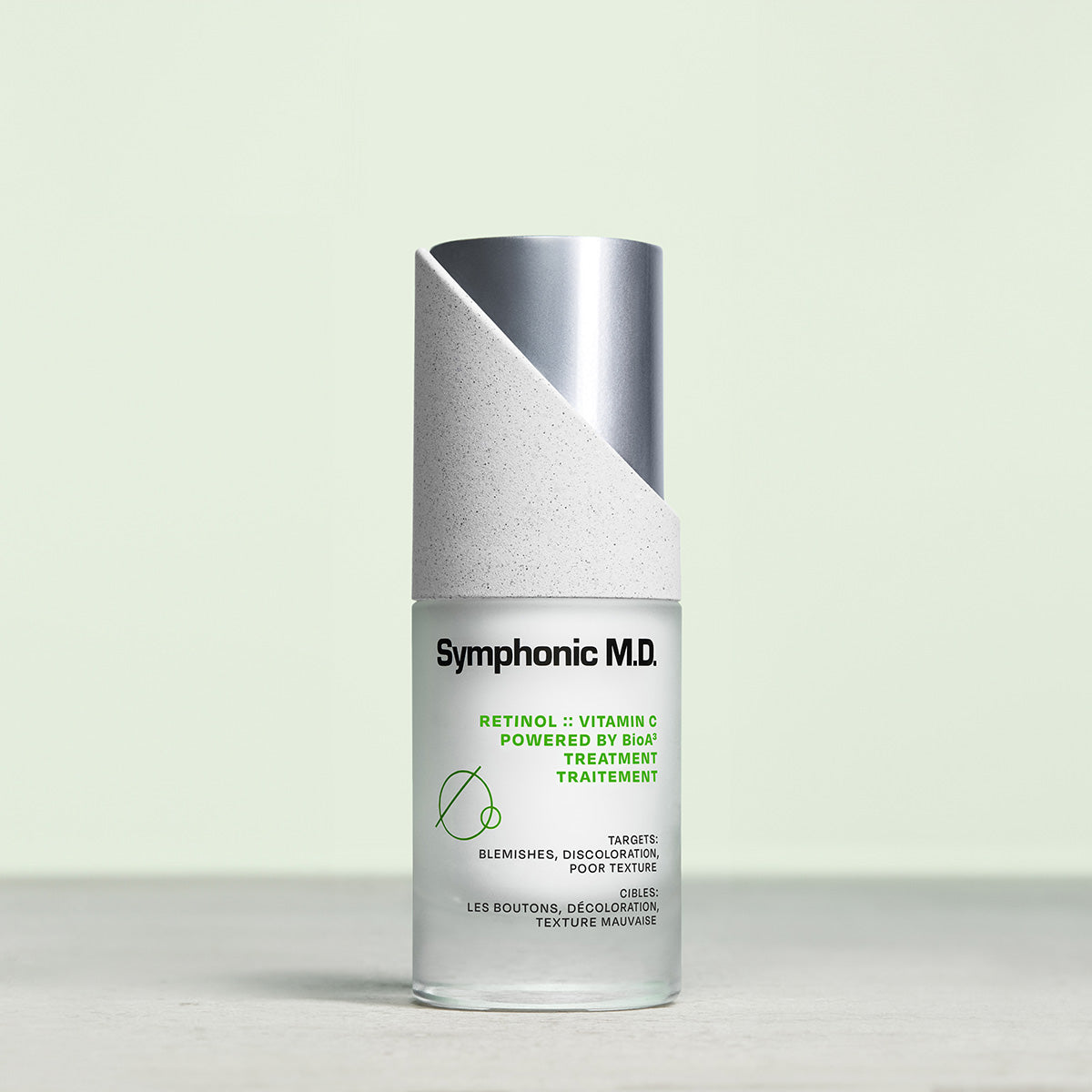
Retinol :: Vitamin C
Try a retinoid
Retinoids, such as retinol, boost collagen, increase cell turnover, and promote hydration – which are hugely important for treating and preventing grainy skin. They can also be used to help skin conditions such as acne, and reduce hyperpigmentation, such as dark spots. In fact, many dermatologists recommend retinoids as a method of combating grainy complexions.
There are several over-the-counter products you can try, including Symphonic M.D.’s Retinol: Vitamin C Powered by BioA3 Treatment.
Protect your skin from UV rays
One of the best things you can do for your skin is protect it from the sun, even on a dull and cloudy day.
UV rays are damaging in a huge number of ways – contributing to wrinkles, hyperpigmentation, a leathery complexion, and, of course, grainy skin. However, by introducing sunscreen to your daily skincare routine you can combat these harmful rays and minimize their effects on your skin.
Professional treatments
If your grainy skin is particularly severe, or you’re looking for faster, more impactful results, there are several professional treatments available.
Whilst they’re effective, these treatments are generally quite expensive, and they can sometimes come with undesirable side-effects, so always consider these options very carefully.
Seek professional advice
Before you undertake any treatments, speak to a dermatologist or esthetician who can suggest the best course of action for your particular skin type. In addition to professional treatments, they may be able to suggest at-home remedies that compliment or replace more intense procedures.
Have a chemical peel
A chemical peel is incredibly effective at removing the dead skin cells responsible for an uneven texture, uneven tone and dullness. However, if the price tag is too high, you can buy at-home masks which might not be quite as effective, but are certainly more affordable.
Consider microneedling
Microneedling uses small, sterilized needles to prick the skin, which increases collagen and elastin, removes dead skin cells, and evens out skin tone. The result is a smoother texture and a glowing complexion.
Try laser resurfacing
Laser treatments are usually reserved for severe and stubborn skin texture issues as they tend to be more aggressive and costly. Ablative lasers remove the top layer of skin while heating the underlying layers to stimulate the production of collagen, remove damaged skin cells, and promote skin renewal.
Non-ablative lasers are a good alternative for those worried about side-effects and recovery time. While the top layer of skin remains, collagen is still stimulated, leading to a gradual improvement in texture.
Look into microdermabrasion
Microdermabrasion is a less-invasive procedure, which involves spraying tiny crystals onto the skin, then vacuuming them away.
This process effectively removes dead skin cells, reduces the size of enlarged pores, and stimulates collagen production, leading to smoother skin.
Lifestyle adjustments
The battle for smooth skin also begins from the inside. By making small adjustments to what you put into your body and how you treat it, you can make big changes to the texture of your complexion.
Stay hydrated
We all know that drinking plenty of water is vital for a healthy body. But it’s also hugely important for healthy, smooth skin – which is your body’s largest organ.
Drinking water improves the elasticity of your skin and, unsurprisingly, keeps it hydrated to reduce dryness and roughness. Aim for at least eight glasses a day to maintain a healthy, glowing complexion.
Eat foods high in certain nutrients
A well-balanced diet combining certain, important nutrients can play a large role in improving your skin texture.
Antioxidant-rich foods, such as berries, citrus fruits, tomatoes, spinach, and carrots, help protect your skin from damaging free radicals. Whilst the omega-3 fatty acids, found in fatty fish, walnuts, flaxseeds, and chia seeds can help it stay hydrated and smooth.
Other skin-boosting nutrients include:
- Protein - found in lean meats, fish and tofu
- Vitamin A - found in foods such as sweet potatoes, spinach, and carrots
- Vitamin E - found in nuts and seeds
- Zinc - found in lean meats, nuts, seeds, and whole grains.
As unusual as it may sound, adding a probiotic to your diet could also help conditions such as acne and eczema, as well as help protect your skin from the sun’s UV rays.
Exercise
Regular exercise increases the blood flow to your skin, delivering vital oxygen and nutrients to the cells so they’re healthier and radiant, and your skin feels soft and smooth. Plus it can increase collagen production, boosting the skin’s firmness and elasticity.
Sweating through exercise can also remove toxins from your pores to create a clearer and glowing complexion.
In addition, studies about skin and exercise have demonstrated that regular aerobic activity makes the skin’s outer layer thinner, and the inner layers thicker, resulting in a smoother complexion – the opposite of what usually happens when we age.
Get some rest
Getting plenty of sleep goes a long way to improving skin texture issues. Your skin (like the rest of your body) repairs itself during deep sleep. Old and damaged cells are replaced by new, healthy cells, giving your skin a smoother look and feel.
Your skin’s barrier is also maintained to protect it against irritants and keep it hydrated – and not only that, your body's hydration levels are restored during sleep.
In addition, by getting enough quality sleep, you produce more collagen, which is your skin’s best friend.
Avoid smoking
Whether you’re a smoker yourself, or you spend a lot of time in a smoky atmosphere, both internal and external exposure can damage the skin and cause premature aging, resulting in a grainier appearance.
Smoking reduces blood circulation to your skin’s surface, makes it dehydrated, breaks down collagen, and prevents skin from healing and regenerating. It also leads to a higher risk of conditions such as acne and psoriasis.
After quitting smoking, your skin should begin to feel plumper, smoother, and healthier – and the rest of your body will benefit too.
Drink less alcohol
Reducing your alcohol intake – or stopping completely – can make a huge difference to your skin’s texture.
Because alcohol dehydrates your whole body, your skin can feel dry, rough, and flaky. It also breaks down collagen and elastin, which are essential for firmness and elasticity.
Alcohol consumption can also cause inflammation to the skin on your face, making it appear irritated and red. Plus, it disrupts your hormonal balance, which can contribute to acne and other breakouts.
Plus, an unwelcome side-effect of drinking alcohol is a lack of quality sleep – which, as we’ve already mentioned, is vital for allowing the skin to regenerate.
The bottom line
Grainy, or textured skin has many different causes, and identifying the source of yours can help you tackle it in the most effective way.
Remedies you might want to try can include a change to your skincare routine, professional treatments, and lifestyle changes – or a combination of these approaches. It’s worth experimenting with a few different approaches until you find what works best for you.
If you’re in any doubt about the cause of your grainy skin, or which actions will be most impactful for your particular skin type, speak to a dermatologist who will be able to advise you on the best way forward.
